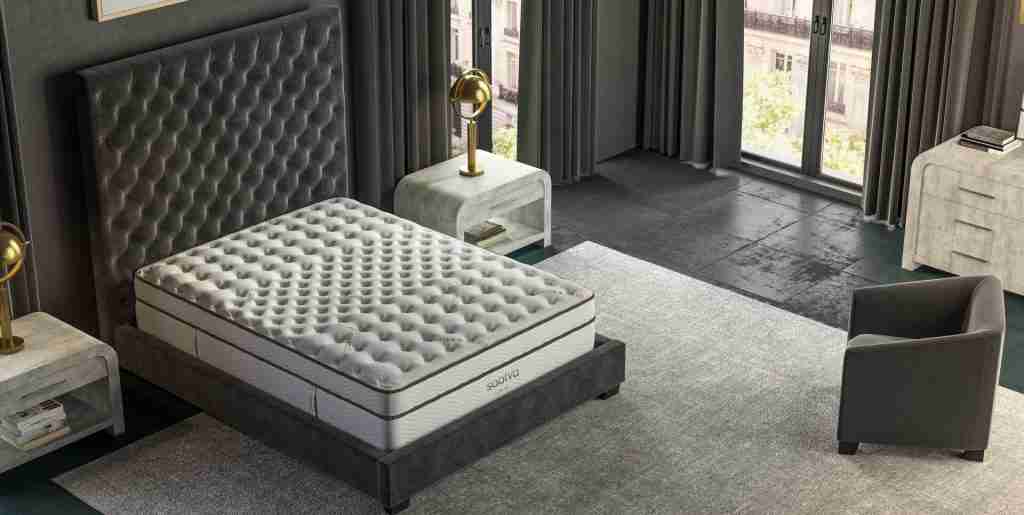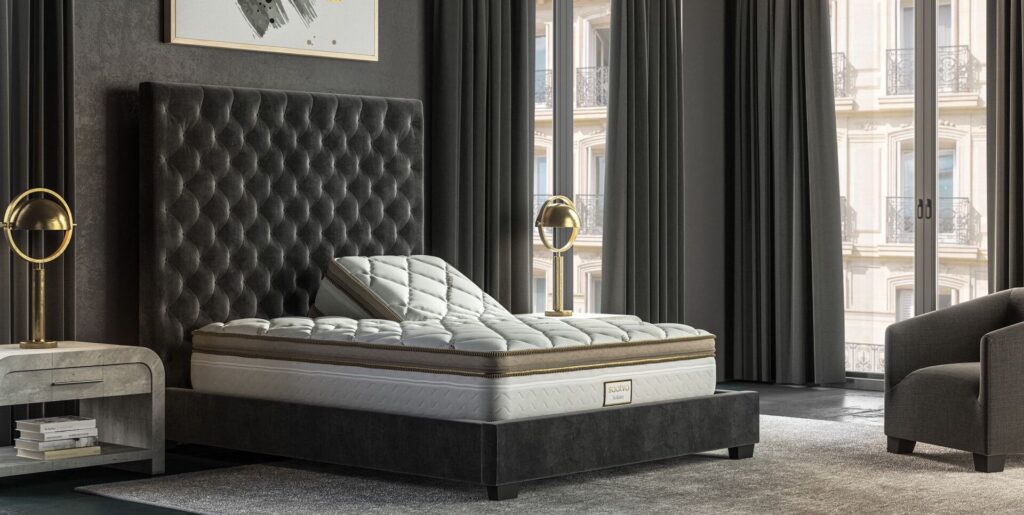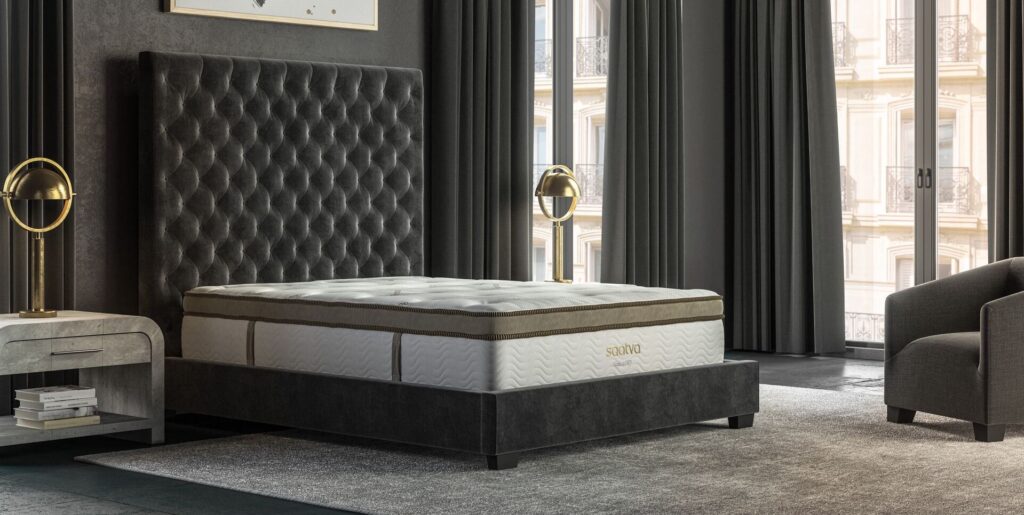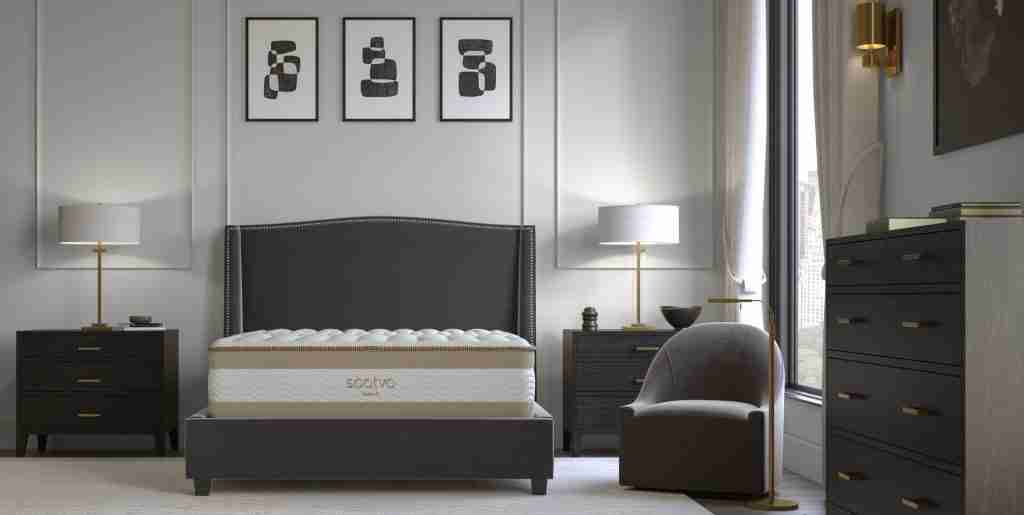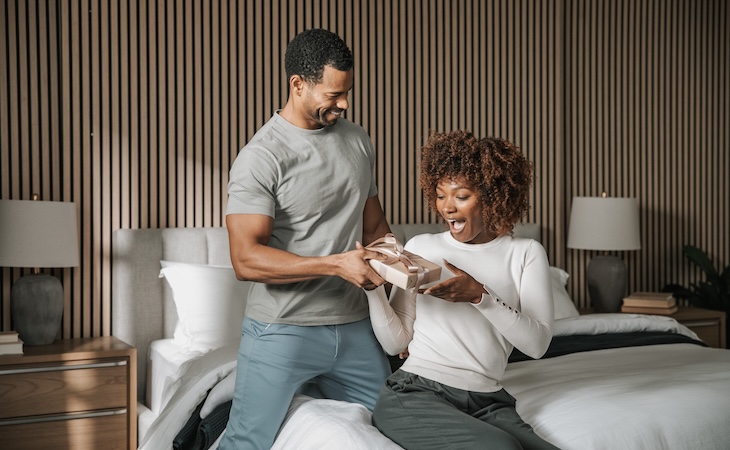
March 2, 2022, updated on July 23, 2025
How to Go to Sleep Fast: 24 Tips to Help You Fall Asleep Quickly
Written by Hailey Hudson, Aly Walansky

Trouble falling asleep often stems from stress, poor sleep habits, or overstimulation. To rest easier, try relaxation techniques like 4-7-8 breathing, muscle relaxation, visualization, or yoga. Avoid screens and caffeine before bed, keep a consistent schedule, and create a calming sleep environment. Small changes can lead to deeper, faster sleep.
We all struggle to fall asleep sometimes—and there are many reasons why this could be happening. Perhaps you had an espresso martini after dinner and now the alcohol and caffeine are preventing you from getting adequate rest. Or maybe you’re stressed about work, money, or the current news cycle.
The good news is, there are several methods you can try to fall asleep more quickly if you’re having trouble catching those Z’s for whatever reason. Ahead, learn more about what prevents you from falling asleep and find the best quick tips for snoozing.
Watch this video about how to put together a relaxing nighttime routine:
Why can’t you fall asleep?
“The causes of insomnia are often framed as lifestyle failures or psychiatric symptoms, but from my experience, they are more often survival reflexes misfiring in modern conditions,” says Roger Washington, MD, family physician and integrative sleep and wellness expert. “Stress and anxiety, for example, do not merely cause insomnia—they emerge from the same physiological state of missed sleep readiness.”
He explains that when the body perceives it’s not safe to sleep (because of light, stimulation, or unresolved tension), this triggers neurochemical surges—cortisol, orexin—that make you alert and restless. [1] “What people call ‘anxiety’ at bedtime may simply be the downstream consequence of this biologically appropriate, but mistimed, reflex,” notes Washington.
Here’s more on the top reasons you might have trouble falling asleep at night:
- Stress or anxiety: “When your mind races with worries, your body produces cortisol and adrenaline, making it nearly impossible to relax,” says Andres Moran, co-founder and CEO of sleep apnea treatment company, Complete Sleep. [2] Moran suggests creating a “worry window” earlier in the day to process concerns, practicing mindfulness meditation, and creating a pre-sleep ritual that signals safety to your nervous system.
- Poor sleep hygiene: “This encompasses inconsistent bedtimes, using your bed for activities other than sleep, and having a disruptive sleep environment,” says Moran. Consider treating your bedroom as a sanctuary and only use it for sleep and intimacy, not for work or eating or anything else. [3] This helps create an environment of more consistent sleep and wake times even on weekends.
- Irregular sleep-wake cycles: Your circadian rhythm thrives on predictability. “Disruptions confuse your internal clock, making it unclear when to release sleep-promoting hormones like melatonin,” says Moran. Try to seek bright light in the morning, but avoid bright lights in the evening—and maintain consistent meal times to reinforce your body’s natural rhythms. [4]
- Overstimulation before bed (screens, caffeine): “Blue light from screens suppresses melatonin production, while caffeine can remain in your system for six to eight hours,” says Moran. Your best bet? Moran advises creating a “digital sunset” by avoiding screens one to two hours before bed, switching to warm lighting in the evening, and avoiding caffeine after 2 pm. If you must use devices, use blue light filters or glasses. [5]
Special considerations
Beyond the most common causes of not being able to fall asleep, there are some more specific circumstances that can lead to trouble sleeping.
- Shift workers and inconsistent schedules: “Your challenge is working against your natural circadian rhythm,” reminds Moran. [6] Counteract this by using blackout curtains and eye masks to create darkness during daytime sleep. Moran also says to consider strategic caffeine use at the beginning of your shift, maintain consistent sleep duration even if timing varies, and use light therapy to help reset your internal clock when transitioning between schedules.
- Travelers and jet lag: Moran suggests starting to adjust your sleep schedule three to four days before travel by shifting bedtime and wake time toward your destination’s schedule. During travel, set your watch to destination time immediately and begin following that schedule. Upon arrival, get sunlight exposure during your new daytime hours and avoid napping longer than 20 minutes. [7]
- Nighttime anxiety: “Anxiety often peaks at bedtime when distractions fade,” says Moran. Keep a notebook by your bed to write down racing thoughts, practice grounding techniques like the 5-4-3-2-1 method (5 things you see, 4 you hear, 3 you touch, 2 you smell, 1 you taste), and consider cognitive behavioral therapy techniques that address anxious thought patterns.
- Sleep apnea: “Sleep position becomes crucial—sleeping on your side can reduce airway obstruction,” says Moran. “Weight management may help reduce symptoms, and avoiding alcohol before bed is essential as it relaxes throat muscles. [8] Working with a sleep specialist for proper diagnosis and treatment is vital.”
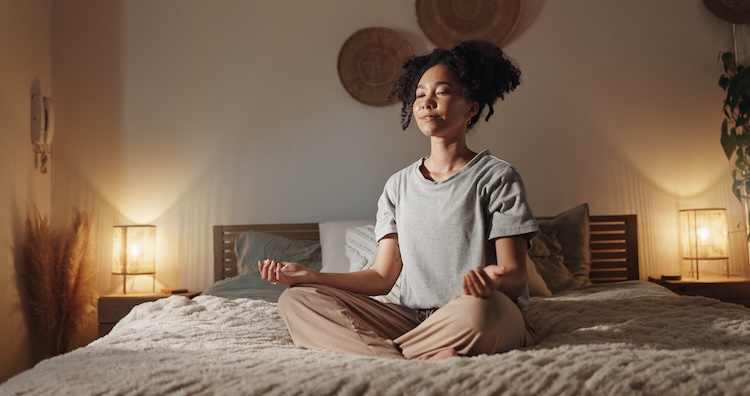
Quick tips for falling asleep faster tonight
4-7-8 breathing method
To try this method, says Moran: Inhale through your nose for four counts, hold for seven counts, and exhale through your mouth for eight counts. “This activates your parasympathetic nervous system and naturally slows your heart rate,” he explains. The extended exhale is particularly effective at triggering relaxation. [9]
Military method (progressive muscle relaxation)
Moran suggests starting by relaxing your facial muscles completely, then work down your body systematically—shoulders, arms, chest, and legs. “This technique was developed to help soldiers fall asleep quickly even in stressful conditions,” says Moran. The key is truly releasing tension from each muscle group before moving to the next. [10, 11]
Visualization and guided imagery
Create detailed mental scenes of peaceful places or activities. “The more sensory details you include, the more effectively your mind disengages from daily stresses,” says Moran. “Many people find success imagining themselves in a hammock, floating on calm water, or walking through a serene forest.”
Meditate before bed
Similar to deep breathing, meditation can aid sleep because it helps you wind down. [12] Use the hour before bed to listen to a deep slumber meditation. And if you wake up during the night, try meditating to help you go back to sleep.
“Meditation can be highly beneficial, particularly body scan or loving-kindness meditations rather than alertness-focused practices,” says Moran. Even 10-15 minutes can significantly calm your nervous system. [13]
Do a yoga routine
Get ready for bed with relaxing yoga poses such as legs up the wall, child’s pose, supine twist, forward fold, or corpse pose. If you need someone to walk you through each pose, you can find yoga videos online.
“Light yoga or stretching helps release physical tension, but avoid vigorous exercise within three hours of bedtime as it raises core body temperature and alertness,” says Moran. [14] “Focus on restorative poses like child’s pose or legs-up-the-wall.”
Stretch your body
If the word “yoga” sounds too intimidating, you can also do simple basic stretches at night instead. For instance, a seated twist promotes muscle relaxation, while a lying hip stretch is good for people who sit at a desk all day.
Exercise during the day
Exercise can have major benefits for your sleep—especially if you work out in the early morning. Morning workouts help you maintain a routine. They decrease your nighttime blood pressure too, which aids your shuteye all night long. [15]
Take a warm bath
Studies show a warm bath before bed can help you get a deeper sleep when your body temperature drops post-tub time. Time your bath an hour or two before bed and soak for at least 20 minutes. [16]
“A warm bath followed by cooling down mimics the natural dip in evening temperatures,” says Washington. The act of massaging the body during the drying process offers the added benefit of inducing the release of hormones that stimulate bonding and feelings of safety, he says. [17]
Put on socks
Research shows sleeping with socks on can help you fall asleep more quickly and even improve your overall sleep quality. [18, 19, 20] The only exception is if you’re someone who’s going through menopause.
If you’re experiencing hot flashes, you’ll want to avoid anything that makes you feel overly warm in bed. “The ‘sock trick’ works because warming your feet dilates blood vessels, which helps lower your core body temperature—a natural sleep signal,” says Moran.
Express gratitude
Just as children sleep better after talking through their day and reconnecting with a caregiver, “Adults benefit from a brief reflective ritual—releasing stressors, offering forgiveness (especially to self), and expressing gratitude,” says Washington. “I often say: ‘The person who falls asleep grateful sleeps differently. [21] The alternative is to solve your problems while you sleep instead of experiencing the gift of repair and rejuvenation.'”
Listen to relaxing music
The right bedtime playlist can soothe not only your ears but your entire body. Lyric-free music helps decrease levels of cortisol (the stress hormone) and increase dopamine (the pleasure hormone). [22, 23]
Read a book
Reading in bed reduces stress and gets you ready for sleep by slowing your heart rate and easing muscle tension. [24] Reading is even more effective than other common stress-busting techniques!
Choose from nostalgic children’s books, short poems, or bedtime stories written for adults. “Reading physical books (not backlit screens) can help transition your mind away from daily concerns,” says Moran.
Write in a journal
Journaling has similar benefits to reading, helping you relax by bringing closure to your day. [25, 26] Best practices for journaling in bed: Prop yourself up in bed, go old school by writing in a physical notebook, and give yourself plenty of light to work with.
“Journaling, particularly gratitude journaling or brain dumping worries, helps process the day,” says Moran.
Turn down the thermostat
The ideal bedroom temperature for good sleep is between 60 and 67 degrees. [27] While different people are comfortable at different temperatures, as a general rule of thumb, making your bedroom a little cooler at nighttime will help you sleep well.
“Cool body temperature in the evening supports melatonin release,” says Washington.
Block out light and noise
Wondering how to sleep fast in five minutes? Drawing the curtains closed and sleeping with earbuds in might do the trick. Blocking out distractions that could disturb you is key to falling asleep quickly. [28] “White noise machines can mask disruptive sounds,” says Moran.
Sniff essential oils
Lavender, chamomile, sweet orange, ylang-ylang, cedarwood, jasmine, neroli, sandalwood, and vanilla are the best essential oils for promoting sleep. [29, 30, 31, 32, 33, 34] You can add the oils to a bath or a diffuser—or even try misting them over your pillow.
Turn off your phone
Go to sleep fast and easily by simply turning off your phone. The blue light from your devices will make you feel awake and alert—and scrolling social media can stimulate your mind in a bad way. [5]
Turn off your phone an hour before bed or at least put it on night mode. “Avoiding screens is crucial, but if necessary, use blue light filters,” says Moran.
Drink a cup of non-caffeinated tea
Sipping tea that doesn’t include caffeine is a helpful trick to aid sleep. Enjoy an herbal tea like chamomile, valerian, passionflower, or lavender. [35] “Caffeine has a half-life of five to six hours, so afternoon coffee can still affect nighttime sleep,” says Moran.
Use a weighted blanket
When it comes to how to go to sleep fast, using a weighted blanket is one of the best tips. These blankets weigh between 5 and 25 pounds and have a calming effect that helps you fall asleep more quickly.
“Weighted blankets provide deep pressure stimulation that can reduce anxiety and promote relaxation for many people,” says Moran.

Long-term sleep strategies
Reset your sleep schedule
Your body has an internal “sleep clock” that releases the hormone melatonin at the same time each night—and insomnia can mess up this clock. Reset your sleep schedule by exercising each morning, cooling the temperature of your house at night, and dimming lights in the evening.
“Gradually shift your bedtime by 15 to 30 minutes every few days rather than making dramatic changes,” says Moran. “Use light exposure strategically—bright light in the morning and dim light in the evening. Consistency is more important than perfection.”
Adjust your sleep position
If you’re having trouble falling asleep, consider sleeping in a different position. Stomach, back, and side sleeping all have pros and cons—and it could take some experimenting to find the best position for you. (Here’s how to sleep comfortably with a new ear piercing.)
“Side sleeping is generally optimal for most people, particularly left-side sleeping which can improve circulation,” says Moran. [36] “Your pillow should maintain neutral spine alignment—not too high or flat. If replacing your mattress isn’t feasible, a mattress topper can significantly improve comfort at a lower cost.”
Get comfortable on your mattress
Make sure you have the right mattress! The perfect one for you depends on a variety of factors, including your sleep position, age, and health conditions.
Check out our collection of high-quality mattresses, and take our online mattress quiz, to find your ideal match, such as the Saatva Classic, our bestseller, or the Saatva Rx, which is designed for sleepers with chronic back pain or joint issues. We give you 365 nights to try our mattresses at home to see if they’re right for you.
Creating sleep associations
It’s really important to make a bedroom a place of tranquility, and that means only use it for sleep and intimacy. “Use your bed only for sleep and intimacy to strengthen the mental association between your bed and sleep,” says Moran.
If you can’t fall asleep within 20 minutes, get up and do a quiet activity until you feel sleepy, then return to bed.
Seek professional help
“Remember that significant sleep problems, especially those involving loud snoring, breathing interruptions, or persistent daytime fatigue despite adequate sleep time, should be evaluated by a sleep medicine specialist for proper diagnosis and treatment,” says Moran.
FAQs
How do I sleep fast right now?
To fall asleep quickly, start by dimming the lights and turning off all screens. Try the 4-7-8 breathing method: inhale for four seconds, hold for seven, and exhale for eight. This slows your heart rate and activates your relaxation response. You can also try progressive muscle relaxation, visualizing a peaceful scene, or using a weighted blanket to calm your nervous system.
How do you get sleepy in one minute?
While it may take you longer than one minute to fall asleep, you can trigger sleepiness fast by doing the following:
- Slow your breathing using the 4-7-8 method
- Turn down the temperature in your room
- Block out light and noise
- Put on socks to help your body cool down
- Mentally visualize a calming place, like floating in water or walking through a forest
How do the military sleep fast?
The military uses a method called progressive muscle relaxation, which helps soldiers fall asleep in under two minutes—even in stressful conditions. Here’s how to do it:
- Relax your face completely (including your jaw and tongue)
- Drop your shoulders and let your arms go limp
- Exhale and relax your chest
- Let your legs go heavy and loose
The key is fully releasing tension from one body part at a time. With practice, this can help you fall asleep almost instantly.
Next, learn about the best nighttime activities to help you relax.
References
- Fagan, H. A., Huneke, N. T., Domschke, K., & Baldwin, D. S. (2024). The role of the orexin system in the neurobiology of anxiety disorders: Potential for a novel treatment target. Neuroscience Applied, 3, 103922. https://doi.org/10.1016/j.nsa.2023.103922
- Harvard Health. Understanding the stress response. https://www.health.harvard.edu/staying-healthy/understanding-the-stress-response
- Harvard Health. Sleep hygiene: Simple practices for better rest. https://www.health.harvard.edu/staying-healthy/sleep-hygiene-simple-practices-for-better-rest
- National Institute of General Medical Sciences. Circadian Rhythms. https://www.nigms.nih.gov/education/fact-sheets/Pages/circadian-rhythms
- Silvani, M. I., Werder, R., & Perret, C. (2022). The influence of blue light on sleep, performance and wellbeing in young adults: A systematic review. Frontiers in Physiology, 13, 943108. https://doi.org/10.3389/fphys.2022.943108
- Moreno C. R. C. (2025). Shift work sleep disorder. Handbook of clinical neurology, 206, 89–92. https://doi.org/10.1016/B978-0-323-90918-1.00015-0
- Mayo Clinic. Jet lag disorder. https://www.mayoclinic.org/diseases-conditions/jet-lag/symptoms-causes/syc-20374027
- National Heart, Lung, and Blood Institute. Sleep Apnea Treatment. https://www.nhlbi.nih.gov/health/sleep-apnea/treatment
- Myerholtz, L. (2023). Take a Deep Breath. Family Medicine, 55(4), 284. https://doi.org/10.22454/FamMed.2023.731271
- Khir, S. M., Azam Wan Mohd Yunus, W. M., Mahmud, N., Wang, R., Panatik, S. A., Mohd Sukor, M. S., & Nordin, N. A. (2024). Efficacy of Progressive Muscle Relaxation in Adults for Stress, Anxiety, and Depression: A Systematic Review. Psychology Research and Behavior Management, 17, 345. https://doi.org/10.2147/PRBM.S437277
- U.S. Department of Veterans Affairs. Progressive Muscle Relaxation. https://www.mirecc.va.gov/visn5/EBT/CBT-CP/Session-5-Progressive-Muscle-Relaxation.asp
- Rusch, H. L., Rosario, M., Levison, L. M., Olivera, A., Livingston, W. S., Wu, T., & Gill, J. M. (2019). The effect of mindfulness meditation on sleep quality: a systematic review and meta-analysis of randomized controlled trials. Annals of the New York Academy of Sciences, 1445(1), 5–16. https://doi.org/10.1111/nyas.13996
- May, C. J., Ostafin, B. D., & Snippe, E. (2020). Mindfulness meditation is associated with decreases in partner negative affect in daily life. European Journal of Social Psychology, 50(1), 35-45. https://doi.org/10.1002/ejsp.2599
- Turmel, D., Carlier, S., Bruyneel, A. V., & Bruyneel, M. (2022). Tailored individual Yoga practice improves sleep quality, fatigue, anxiety, and depression in chronic insomnia disorder. BMC Psychiatry, 22, 267. https://doi.org/10.1186/s12888-022-03936-w
- Korkutata, A., Korkutata, M., & Lazarus, M. (2025). The impact of exercise on sleep and sleep disorders. Npj Biological Timing and Sleep, 2(1), 1-10. https://doi.org/10.1038/s44323-024-00018-w
- Haghayegh, S., Khoshnevis, S., Smolensky, M. H., Diller, K. R., & Castriotta, R. J. (2019). Before-bedtime passive body heating by warm shower or bath to improve sleep: A systematic review and meta-analysis. Sleep Medicine Reviews, 46, 124-135. https://doi.org/10.1016/j.smrv.2019.04.008
- Morhenn, V., Beavin, L. E., & Zak, P. J. (2012). Massage increases oxytocin and reduces adrenocorticotropin hormone in humans. Alternative therapies in health and medicine, 18(6), 11–18. https://pubmed.ncbi.nlm.nih.gov/23251939/
- Cleveland Clinic. Can Wearing Socks to Bed Help You Sleep Better? https://health.clevelandclinic.org/sleeping-with-socks-on
- Raymann, R. J., Swaab, D. F., & Van Someren, E. J. (2007). Skin temperature and sleep-onset latency: changes with age and insomnia. Physiology & behavior, 90(2-3), 257–266. https://doi.org/10.1016/j.physbeh.2006.09.008
- Ko, Y., & Lee, Y. (2018). Effects of feet warming using bed socks on sleep quality and thermoregulatory responses in a cool environment. Journal of Physiological Anthropology, 37, 13. https://doi.org/10.1186/s40101-018-0172-z
- Wood, A. M., Joseph, S., Lloyd, J., & Atkins, S. (2009). Gratitude influences sleep through the mechanism of pre-sleep cognitions. Journal of Psychosomatic Research, 66(1), 43-48. https://doi.org/10.1016/j.jpsychores.2008.09.002
- Lata, F., & Kourtesis, I. (2021). Listening to music as a stress management tool. European Psychiatry, 64(Suppl 1), S609. https://doi.org/10.1192/j.eurpsy.2021.1621
- Zaatar, M. T., Alhakim, K., Enayeh, M., & Tamer, R. (2023). The transformative power of music: Insights into neuroplasticity, health, and disease. Brain, Behavior, & Immunity – Health, 35, 100716. https://doi.org/10.1016/j.bbih.2023.100716
- Finucane, E., Treweek, S., Newell, J., Das, K., Chapman, S., Wicks, P., Galvin, S., Healy, P., Biesty, L., Gillies, K., Noel-Storr, A., Gardner, H., & Devane, D. (2021). Does reading a book in bed make a difference to sleep in comparison to not reading a book in bed? The People’s Trial—An online, pragmatic, randomised trial. Trials, 22, 873. https://doi.org/10.1186/s13063-021-05831-3
- Scullin, M. K., Krueger, M. L., Ballard, H. K., Pruett, N., & Bliwise, D. L. (2017). The Effects of Bedtime Writing on Difficulty Falling Asleep: A Polysomnographic Study Comparing To-Do Lists and Completed Activity Lists. Journal of Experimental Psychology. General, 147(1), 139. https://doi.org/10.1037/xge0000374
- Harvey, A. G., & Farrell, C. (2003). The efficacy of a Pennebaker-like writing intervention for poor sleepers. Behavioral sleep medicine, 1(2), 115–124. https://doi.org/10.1207/S15402010BSM0102_4
- Cleveland Clinic. What’s the Best Temperature for Sleep? https://health.clevelandclinic.org/what-is-the-ideal-sleeping-temperature-for-my-bedroom
- Ebben, M. R., Yan, P., & Krieger, A. C. (2021). The effects of white noise on sleep and duration in individuals living in a high noise environment in New York City. Sleep medicine, 83, 256–259. https://doi.org/10.1016/j.sleep.2021.03.031
- Karadag, E., Samancioglu, S., Ozden, D., & Bakir, E. (2017). Effects of aromatherapy on sleep quality and anxiety of patients. Nursing in Critical Care, 22(2), 105-112. https://doi.org/10.1111/nicc.12198
- Takeda, A., Watanuki, E., & Koyama, S. (2017). Effects of Inhalation Aromatherapy on Symptoms of Sleep Disturbance in the Elderly with Dementia. Evidence-Based Complementary and Alternative Medicine, 2017(1), 1902807. https://doi.org/10.1155/2017/1902807
- Arzi, A., Sela, L., Green, A., Givaty, G., Dagan, Y., & Sobel, N. (2010). The Influence of Odorants on Respiratory Patterns in Sleep. Chemical Senses, 35(1), 31-40. https://doi.org/10.1093/chemse/bjp079
- Hwang J. H. (2006). The effects of the inhalation method using essential oils on blood pressure and stress responses of clients with essential hypertension. Taehan Kanho Hakhoe chi. 36(7), 1123–1134. https://doi.org/10.4040/jkan.2006.36.7.1123
- Komori, T., Fujiwara, R., Tanida, M., Nomura, J., & Yokoyama, M. M. (1995). Effects of citrus fragrance on immune function and depressive states. Neuroimmunomodulation, 2(3), 174–180. https://doi.org/10.1159/000096889
- WorldHealth.net. Jasmine Found to Encourage Restful Sleep. https://worldhealth.net/news/jasmine_found_to_encourage_restful_sleep/
- Cleveland Clinic. Restless? Try These Bedtime Teas for Better Sleep. https://health.clevelandclinic.org/tea-for-sleep
- American Heart Association. Can sleep position affect your heart and brain health? https://www.heart.org/en/news/2025/01/24/can-sleep-position-affect-your-heart-and-brain-health
Hailey Hudson
Hailey Hudson is a full-time freelance writer and content marketer based out of Atlanta. She writes about healthcare, marketing, and pets for clients like Healthline, Adobe, and Chewy. In her spare time, Hailey writes YA novels, snuggles with her cat, and sings musical theater (not all at the same time).
Aly Walansky
Aly Walansky has been covering lifestyle topics, with a focus on food, home, and wellness, for two decades. She has covered everything from budget shopping to recipes to culinary travel content for national publications that include the Food Network, Southern Living, Food & Wine, Travel & Leisure, The Kitchn, and more. Aly is ranked among top 10 journalists of 2023 and top 10 freelance journalists in 2024, as well as the #1 food journalist of 2022, by Muck Rack.
